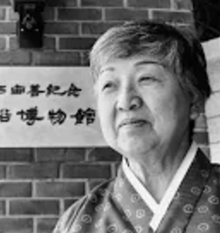Seok Ju-seon
Seok Ju-seon | |
|---|---|
 | |
| Born | September 17, 1911 |
| Died | March 3, 1996 (aged 84) |
| Relatives | Seok Joo-myung (brother) |
| Korean name | |
| Hangul | 석주선 |
| Hanja | 石宙善 |
| Revised Romanization | Seok Ju-seon |
| McCune–Reischauer | Sŏk Chu-sŏn |
Seok Ju-seon (variously Seok Juseon or Suk Ju Seon; September 17, 1911 – March 3, 1996) was a scholar of traditional Korean clothing[1] and a folklorist.[2][3] Her works include The History of Korean Dresses and Ornaments.[4][5]
Ju-seon donated over 3,300 items to the museum named for her at Dankook University, so it could curate and conserve Korean historical costume.[3] The Seok Juseon Memorial Folk Museum was established in 1981, and combined with the Central Museum in 1999 to form the Seok Juseon Memorial Museum.[citation needed] Pieces from the collection were included in the first full-scale survey on art from the Joseon dynasty to be shown in the United States, Treasures from Korea: Arts and Culture of the Joseon Dynasty, 1392-1910.[6]
Among the pieces Seok Ju-seon collected were cotton fabrics hand-woven according to traditional methods by Kim Man-ae of the village of Saetgol in Naju, South Jeolla province. Kim Man-ae was named a Living Human Treasure in 1969 for her weaving skills and her generous contributions to Seok Ju-seon's research.[7]
References[edit]
- ^ Woo, Alyssa (December 9, 2015). "Lee Young Hee designs modern hanboks that everyone can wear". The Straits Times. Retrieved 4 June 2017.
- ^ Seok Juseon Memorial Museum (Korean)
- ^ a b "Seok Juseon Memorial Museum, Dankook University, South Korea - Google Arts & Culture". Google Cultural Institute. Retrieved 2017-06-02.
- ^ Ju-seon, Seok (1972). The History of Korean Dresses and Ornaments. Seoul: Pochinchae.
- ^ Yeong-hak, Son (2009). Handicrafts of the Korean people (2nd ed.). Seoul: Dahal Media. ISBN 9788989988137.
- ^ Jenkins, Kristina (January 31, 2014). "Coming Attraction: Philadelphia Museum Of Art Presents Treasures from Korea: Arts and Culture of the Joseon Dynasty, 1392-1910, Opening Sunday, March 2". UWISHUNU Philadelphia. Retrieved 4 June 2017.
- ^ Hyun-sook, Park (2012). "100th special edition:Intangible cultural heritage". Koreana: Korean culture and arts. 26 (3). ISBN 9788986090635. Retrieved 4 June 2017.
